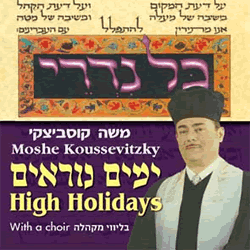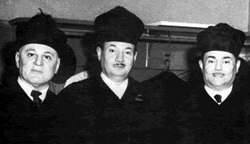......Moshe Koussevitzky was born on June 9th 1899 at Smargon and came
from a background of Cantors. He was the oldest of four brothers, Jacob,
Simcha and David; each of whom went on to become famous Chazanim in
their own right. Moshe began his singing career at the age of eight
as an alto in the choir of Chazan Shlepak. Like many artistic people,
he could not only sing, but he was also gifted with his hands. As he
grew up he toyed with the idea of becoming an artist or a sculptor.
Fortunately, however, he accepted a position as Chazan at the Vilna
'Savel's Shul' and in 1927 he auditioned for the plum position in Poland
at the 'Tlomazke Shul' in Warsaw where, against the finest opposition,
he was awarded the post. He took the opportunity to study voice and
music, and throughout his life he always learned Torah.
Being in such an illustrious Cantorial postion, his fame spread around
Europe very rapidly and soon Moshe traveled to Brussels, Antwerp, Vienna
and London to give concerts. During World War II, Moshe took his family
to Russia and adopted the name Mikhail Koussevitzky. While he was there
he sang in the operas Boris Goudinov, Tosca and Rigoletto. When he returned
to Poland he gave a concert at which the ambassadors of the United Kingdom
and the United States were in the audience. As a result of this concert
he obtained visas for both countries and came to England until 1947,
when he traveled to settle in America.
Moshe continued to travel and concertise all over the world. Fortunately
he also made numerous recordings and, even though many of them were
produced on comparatively primitive equipment, it is still possible
to appreciate the exceptional quality of his voice. The last Cantorial
position he held was at Temple Beth El in Boro Park, Brooklyn. He died
on August 23rd 1966 and is buried in Jerusalem.
Cantor David Koussevitsky
While Moishe was admired for the strength, power and range of his voice
it was David Koussevitsky who had the sweeter voice. In Hebrew this
quality is called Metikut literally sweetness. David certainly
had a most unusual voice, and was able to maintain long phrases on very
high notes. Others have tried to copy him, but few have succeeded in
coming anywhere near the excitement that he could generate by his extraordinary
singing.
As a child David Koussevitzky sang in the choir in the Vilna Great Synagogue.
He was intent on following a musical career from the start. He studied
at the Vilna Academy of Music and became a choir master at the age of
eighteen. After serving in the Polish army, he continued his voice studies
in Warsaw, officiating at various Synagogues before becoming the Chief
Chazan in Rovna.
In his middle twenties, he accepted a call to the Hendon Synagogue,
London, where he stayed for twelve years. Koussevitzky was not enthused
with the life of a Chazan in the United Synagogue in London. In his
book, 'Chosen Voices,' Mark Slobin quotes from a verbatim interview
with David in which David says: "[Working for the United Synagogue]
was like a government. Each shul sends their representative, like to
the House of Commons... it's like the Church of England... They all
had their traditional music. They had a Blue Book that they give you,
and they tell you, "use it as much as possible..." You had
to be there every shabbes... and [I] taught in Jews' College. I used
to share the weekday services with the rabbi. I did Sunday morning.
No layman was allowed to officiate...." He relates how he did not
want to leyn (read the Torah), and eventually got an agreement with
the 'chief warden' that he wouldn't be expected to do so
A business man, who used to travel frequently between England and the
USA, persuaded David to set his sights higher and in 1948, after the
businessman helped him to obtain a visa, he went to America and was
appointed to the highly prized position at Temple Emanu-El in Boro Park,
Brooklyn. .....
For the rest go to http://www.uscj.org/njersey/w-orange/Cantor/Cantor2003feb.htm
Moshe Koussevitzky |
Brothers; David Kusevitsky and Moshe Koussevitzky with Moshe Ganchoff (Photo courtesy of the International Center and Archives of Jewish Music Foundation) |

